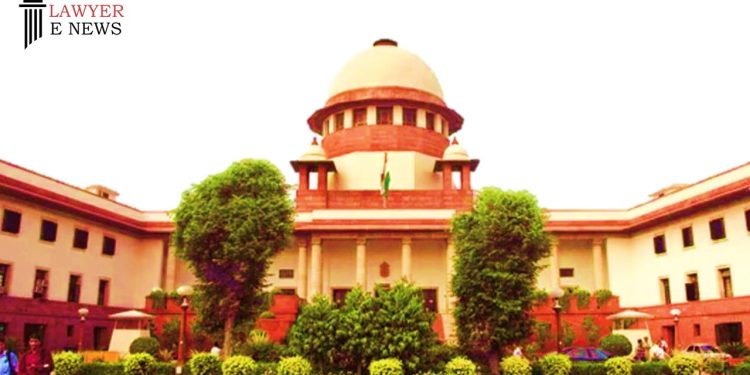Two views possible in circumstantial evidence cases, choose the one favoring the accused: Supreme Court

[web_stories title=”true” excerpt=”false” author=”false” date=”false” archive_link=”true” archive_link_label=”https://lawyer-e-news.com/two-views-choose-the-one-favoring-the-accused-sc/” circle_size=”150″ sharp_corners=”false” image_alignment=”left” number_of_columns=”1″ number_of_stories=”5″ order=”DESC” orderby=”post_title” view=”circles” /]On dated 16th March 2023, Supreme Court, in a recent judgement PRADEEP KUMAR Vs. STATE OF CHHATTISGARH, stated that cardinal principles in the administration of criminal justice in cases where heavy reliance is placed on circumstantial evidence, is that where two views are possible, one pointing to the guilt of the accused and the other towards his innocence, the one which is favorable to the accused must be adopted.
Facts
In 2003, Umesh Chowdhary was allegedly murdered by Pradeep Kumar and Bhainsa alias Nandlal in village Chitarpur. The investigation revealed that the motive was Pradeep Kumar’s desire to use the deceased’s shop. The trial court convicted both accused based on their extra-judicial confessional statement, testimonies of witnesses and the recovery of keys and currency notes from the possession of the appellant. The court sentenced them to life imprisonment and a fine for the offence under Section 302/34 IPC and seven years of imprisonment and a fine for the offence under Section 201 IPC. The court found the testimonies of witnesses reliable, and the prosecution had established the case against the accused. High Court upheld the conviction of accused Pradeep Kumar in relation to all the offences and the sentences in terms thereunder but acquitted accused Bhainsa alias Nandlal on all counts.
Observed and Held
Supreme Court held that the accused cannot be convicted on the principles of preponderance of probability and that the benefit of doubt, if any, must be given to the accused. The impugned judgement was found to be sketchy and resulted in a travesty of justice.
The Supreme Court examined the testimonies of the prosecution witnesses in a case related to the murder of Umesh Chowdhary. The court found that the complaint filed by Gajadhar Chowdhary did not disclose any suspicion of any person having committed the crime, and there was a significant time gap between the last sighting of the deceased and the time of the crime. The court also found material improvement in the testimony of Gajadhar Chowdhary, who failed to make inquiries about the cause of the incident from any of the villagers and was not a spot witness. The court found him to be unreliable and his testimony not worthy of credence. The court also noted that Sirodh (PW-6), who was the owner of the shop and the last person to have seen the deceased, did not support the prosecution in court.
Supreme Court also examined those discrepancies and contradictions in the testimonies of other witnesses such as Vinay Kumar and Radhika, which cast doubt on the prosecution’s case. Specifically, the Court notes that the motive of commission of the crime, i.e. the issue of use of the shop between the parties, is not supported by the witness testimonies.
The Supreme Court noted that there is no independent corroborated material to support the circumstance of recovery of keys and money, except for the unproven confessional statement of the accused. The keys, currency notes, and blood-stained clothes were not sent for chemical analysis, and the FSL report of the alleged blood-stained clothes was unexhibited and unproven. Additionally, no one came forward to depose that the accused had kept the keys of the shop with himself. Therefore, the Court found this circumstance to be unsupported by evidence.
The Supreme Court observed that the extra-judicial confessional statement of the accused was hit by Section 27 of the Indian Evidence Act, 1872 and was not supported by witnesses Ramkripal Soni and Gopal Yadav, who was himself a suspect. The testimony of Gopal Yadav was found to be unreliable and untrustworthy as he did not disclose the statement made by the accused to anyone until later in the day, and did not make inquiries for ascertaining the truth from any co-villagers, including all those named by him.
Supreme Court observed that the testimony of the Investigation Officer (PW-19) was wholly unworthy of any credence and unreliable. The witness did not record the statement of important witnesses, did not collect evidence pertaining to the genesis of the crime, did not examine witnesses who may have shed light on the actual occurrence of the incident, and did not provide any basis for suspecting the co-accused Bhainsa. The Investigation Officer’s sole basis for arresting the appellant was his extra-judicial confession which was inadmissible and of no use as it did not lead to the recovery of any new facts. The investigation conducted by the Investigation Officer was shady and done in a casual manner.
The court emphasizes the importance of the presumption of innocence and the need for proof beyond reasonable doubt. The court finds that the chain of circumstances has not been completely established and the guilt of the accused alone has not been proven beyond reasonable doubt. The court sets aside the findings of guilt and sentence and acquits the accused of all charges. Appeal Allowed.
PRADEEP KUMAR Vs. STATE OF CHHATTISGARH





